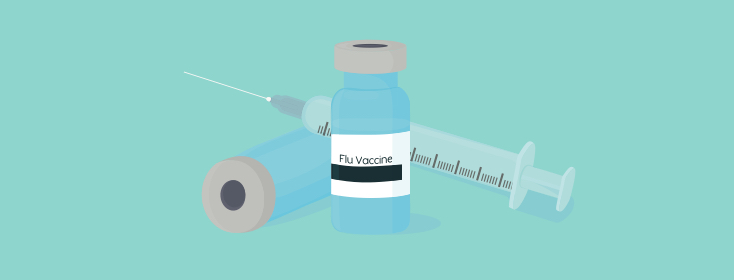Fight the Flu: Important Flu Facts for People With COPD
Flu season is fast approaching, and it's crucial for people with COPD to know how to fight the influenza (also known as "the flu") is a serious contagious illness that can lead to a hospital stay or even death. This is especially true for people who have COPD. The flu virus attacks your already compromised respiratory system and can lead to serious complications.
3 Best Actions to Fight the Flu
- Get your annual flu shot! The Centers for Disease Control (CDC, for short) recommends that everyone6 months of age and older get a flu vaccine by the end of October. A yearly flu vaccine is the first, best and most important step in protecting against the flu. People with chronic illnesses such as COPD and asthma, and adults older than age 65 are especially encouraged to get the flu shot.
- Take steps to stop the spread of germs. The flu is highly contagious, so people with COPD and their caregivers should do everything they can to avoid coming into contact with sick people during flu season. If you should get sick, cover your nose & mouth with a tissue when sneezing or coughing. Wash your hands often and thoroughly with warm water and soap.
- If you come down with the flu, call your doctor right away about getting on an antiviral medication. Prescription medicines are available that can treat the flu, provided you get on them within 24 hours of having flu symptoms. These antiviral medicines can make illness milder and shorten the time you are sick. They may also prevent serious complications.
You might think preventing and treating influenza is simple. Unfortunately, there are many misunderstandings about the flu vaccine. Keep reading to learn the facts about flu shots.
Do Flu Shots Really Work?
Yes! They do. The CDC reports that studies show that flu shots lower the risk of doctor visits due to flu by about 50% to 60%, when the viruses in the vaccine are like the ones spreading in the community. And good news! Flu vaccines this year have been updated to better match circulating flu viruses than in previous years.
We can not guarantee that getting a flu shot will prevent the flu for every person every year. You probably know someone (maybe yourself) who has gotten the flu even after having a flu shot. But, it's important to understand that people who get the flu shot are still likely to get less sick than people who do not.
The most important things that affect how well the flu shot works for you are:
- How well the flu vaccine matches the actual viruses circulating each season
- Your age & health status; older people or those with weaker immune systems may not respond as well to the flu vaccine
Flu viruses change from year to year, so the vaccine is updated each year to fight the viruses research suggests will be most common each flu season. For that reason, you need to get a new flu shot every year. Even if the virus strains do remain the same 2 years in a row, your immunity declines over the year, so you need to be re-vaccinated each season.
When Should I Get the Flu Vaccine?
It's also important to get the flu shot by the end of October, if you can. Flu season usually peaks during January and February, but can begin as early as October, so early vaccination will give you the best protection. It can also last as long as May!
Keep in mind that it takes about two weeks after you get a flu shot for antibodies to develop in the body that will protect you. But, even if you don't get around to getting the flu shot as early as you should, don't skip it. As long as the flu viruses are circulating, it's not too late to get a flu shot!
There are various types of flu vaccine available, but for the 2017-2018 flu season, the CDC is recommending only the injectable type. They do not recommend the nasal spray vaccine this year.
Is the Flu Shot Safe?
Yes, despite what you may have heard, the flu shot is very safe, as long as you are not allergic to it. There can be mild side effects for a day or two after you get the shot. The most common side effects are soreness, redness, tenderness, or swelling at the injection site. Applying ice to the site can help provide relief. A few people may also have a low grade fever or mild aches for a brief time.
Putting up with these mild side effects is still better than catching the flu, especially if you have COPD!
You cannot catch the flu from a flu shot, because the vaccine is made from killed (or dead) versions of the virus.
Where Can You Get a Flu Shot?
People who have chronic illnesses will usually get their flu shots during a regular visit to their doctor in the fall. But, if this doesn't happen for you, there are many other choices. These days, most grocery stores, big box stores like Walmart and pharmacies offer flu shots.
In Summary
If you want to stay as healthy as possible this fall and winter, then you need to get your yearly flu shot! Talk with your doctor about the best plan to make this happen for you. And if you should get sick with the flu anyway, then contact your doctor right away so that you can get on the antiviral flu medicine.

Join the conversation